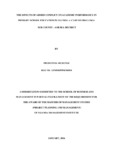| dc.contributor.author | MURUNGI, Proscovia
Bongomin Wilfred Lugemoi (Supervisor)
Twinomuhwezi Ivan (Supervisor) | |
| dc.date.accessioned | 2017-05-16 | |
| dc.date.available | 16:39:45.447 | |
| dc.date.issued | 2016-01 | |
| dc.identifier.citation | APA | en_US |
| dc.identifier.other | 13/MMSPPM/30/034 | |
| dc.identifier.uri | http://hdl.handle.net/20.500.12305/111 | |
| dc.description | A Dissertation Submitted to the School of Business and Management in Partial Fulfillment of the Requirement for the Award of the Masters of Management Studies (Project Planning and Management) of Uganda Management Institute. | en_US |
| dc.description.abstract | The study examined the effects of armed conflict on academic performance in primary school education in Obalanga sub-county, Amuria district in Uganda. The study was guided by the following objectives; to assess the effect of infrastructural destruction on academic performance, to assess the effect of displacement on academic performance and to examine the effect of abduction. A case study design was used and both qualitative and quantitative methods were used in the study. This study targeted 191 respondents with a response rate of 135 respondents. The major data collection methods used included, focus group discussion, questionnaires and interview. Data generated was analyzed through the statistical methods and tabulated in percentages for the case of quantitative data and qualitative data generated and analyzed to get meaning. Qualitative data analysis mainly consisted of a descriptive statistics (frequencies and percentages) and inferential statistics (Pearson correlation coefficient) while content analysis was also used to analyze qualitative data. Findings revealed a moderate positive relationship between infrastructural destruction and academic performance which implied that further infrastructural destruction led to further decline in academic performance. There was a weak positive relationship between displacement and academic performance which implied that displacement of families does not have a significant effect on academic performance and a weak positive relationship between abduction and academic performance meaning increased abduction of pupils led to further decline in academic performance in primary education qualifying the hypotheses. The study found out that the major factors affecting academic performance were infrastructural destruction and abduction. The key recommendations were; rehabilitation of the education deliverables like schools, health centers, teachers houses and human rehabilitation especially those suffering from the post conflict effect. | en_US |
| dc.language.iso | en | en_US |
| dc.publisher | Uganda Management Institute | en_US |
| dc.subject | Armed Conflict | en_US |
| dc.subject | Academic Performance | en_US |
| dc.subject | Amuria District | en_US |
| dc.title | The Effects of Armed Conflict on Academic Performance in Primary School Education in Uganda: A Case of Obalanga Sub-County - Amuria District | en_US |
| dc.type | Thesis | en_US |

